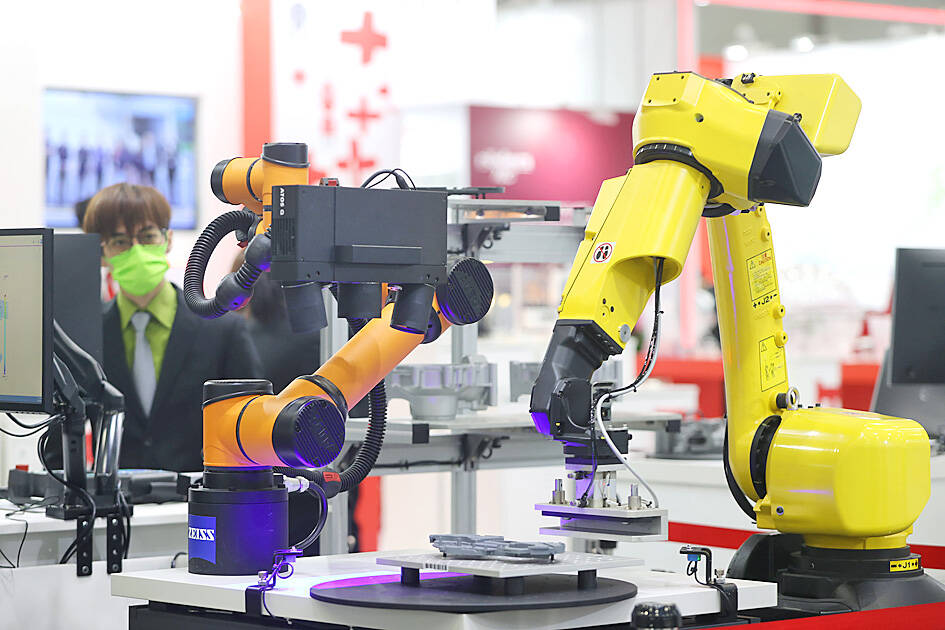The nation’s machinery exports to the US amounted to US$7.19 billion last year, surpassing the US$6.86 billion to China to become the largest export destination for the local machinery industry, the Taiwan Association of Machinery Industry (TAMI, 台灣機械公會) said in a report on Jan. 10.
It came as some manufacturers brought forward or “front-loaded” US-bound shipments as required by customers ahead of potential tariffs imposed by the new US administration, the association said.
During his campaign, US president-elect Donald Trump threatened tariffs of as high as 60 percent on Chinese goods and 10 percent to 20 percent on imports from other countries. Against this backdrop, many local manufacturers received rush orders in recent months, but the association said it remains to be seen if the order momentum would continue after Trump takes office.

Photo: CNA
China’s decision to end tariff reductions on Taiwanese machinery under the Economic Cooperation Framework Agreement (ECFA) early harvest list in June last year also contributed to the lower exports to the country, the association said.
Taiwan’s machinery exports comprise mainly inspection and testing equipment, electronic equipment, and machine tools, the association said.
The US and China remained the two largest buyers of Taiwanese machinery products last year, accounting for 24.6 percent and 23.4 percent share of the nation’s total exports respectively, followed by Japan, with purchases totaling US$2.15 billion, or 7.3 percent, it said.
For the whole of last year, machinery exports totaled US$29.28 billion, down 0.6 percent from US$29.44 billion a year earlier, the association’s data showed.
Exports of electronic equipment increased 4 percent year-on-year to US$4.95 billion, and those of inspection and testing equipment rose 3.6 percent to US$4.377 billion, while outbound shipments of machine tools fell 14.8 percent to US$2.22 billion last year, data found.
The association attributed the decline in machine tool exports to geopolitical conflicts, as local manufacturers actively complied with government regulations and conducted customer verifications to avoid their goods becoming production tools for weapons amid the Russia-Ukraine war, which greatly affected their export orders.
Coupled with the sharp depreciation of the yen and the dumping of low-priced goods from China in overseas markets, Taiwan’s machine tool exports continued to drop last year after an annual decrease of 14 percent in 2023, the most affected among Taiwanese machinery, the association said.
However, there is no need to be pessimistic as local machinery manufacturers would see a gradual recovery in orders this year thanks to the growing economies of India, Mexico and Southeast Asia, it said.
Taiwanese exporters must make early preparations for Trump’s trade policies, as high US tariffs and the priority of US manufacturing would be challenges for Taiwan’s exports, the association said.
Even though machinery products might not be directly affected, indirect impacts are inevitable, it added.

In Italy’s storied gold-making hubs, jewelers are reworking their designs to trim gold content as they race to blunt the effect of record prices and appeal to shoppers watching their budgets. Gold prices hit a record high on Thursday, surging near US$5,600 an ounce, more than double a year ago as geopolitical concerns and jitters over trade pushed investors toward the safe-haven asset. The rally is putting undue pressure on small artisans as they face mounting demands from customers, including international brands, to produce cheaper items, from signature pieces to wedding rings, according to interviews with four independent jewelers in Italy’s main

Japanese Prime Minister Sanae Takaichi has talked up the benefits of a weaker yen in a campaign speech, adopting a tone at odds with her finance ministry, which has refused to rule out any options to counter excessive foreign exchange volatility. Takaichi later softened her stance, saying she did not have a preference for the yen’s direction. “People say the weak yen is bad right now, but for export industries, it’s a major opportunity,” Takaichi said on Saturday at a rally for Liberal Democratic Party candidate Daishiro Yamagiwa in Kanagawa Prefecture ahead of a snap election on Sunday. “Whether it’s selling food or

CONCERNS: Tech companies investing in AI businesses that purchase their products have raised questions among investors that they are artificially propping up demand Nvidia Corp chief executive officer Jensen Huang (黃仁勳) on Saturday said that the company would be participating in OpenAI’s latest funding round, describing it as potentially “the largest investment we’ve ever made.” “We will invest a great deal of money,” Huang told reporters while visiting Taipei. “I believe in OpenAI. The work that they do is incredible. They’re one of the most consequential companies of our time.” Huang did not say exactly how much Nvidia might contribute, but described the investment as “huge.” “Let Sam announce how much he’s going to raise — it’s for him to decide,” Huang said, referring to OpenAI

The global server market is expected to grow 12.8 percent annually this year, with artificial intelligence (AI) servers projected to account for 16.5 percent, driven by continued investment in AI infrastructure by major cloud service providers (CSPs), market researcher TrendForce Corp (集邦科技) said yesterday. Global AI server shipments this year are expected to increase 28 percent year-on-year to more than 2.7 million units, driven by sustained demand from CSPs and government sovereign cloud projects, TrendForce analyst Frank Kung (龔明德) told the Taipei Times. Demand for GPU-based AI servers, including Nvidia Corp’s GB and Vera Rubin rack systems, is expected to remain high,